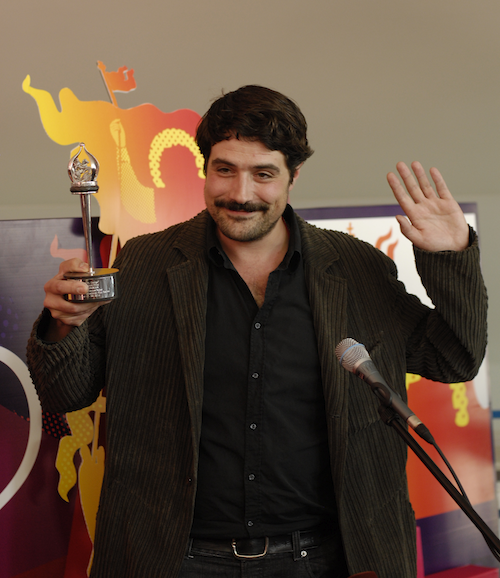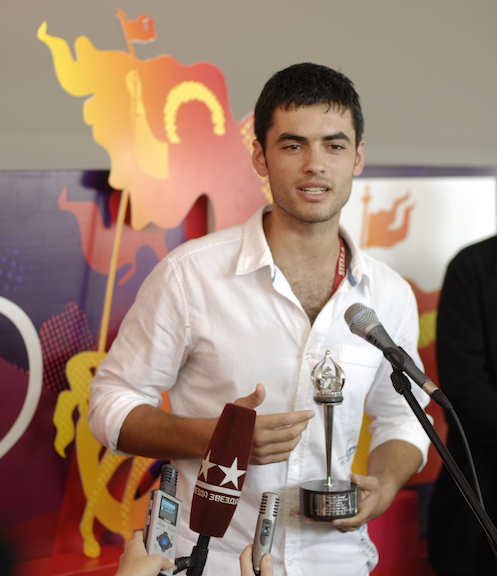« Cluj’s Transilvania International Film Festival (TIFF) celebrates a record edition | Home | Turkish Delight and 3D: Filmstiftung NRW’s International Film Conference at Medienforum NRW »
German Double Triumph in Moscow
By Martin Blaney | June 29, 2010

Johannes Naber received the Special Jury Prize for his debut The Albanian (Der Albaner), courtesy Vladimir Maximov/MIFF

The Silver St. George prize for Best Actor went to The Albanian's lead actor Nik Xhelilaj, courtesy Vladimir Maximov/MIFF
German cinema scored a double triumph at this year’s Moscow International Film Festival (MIFF, June 17 – 26) when feature debutant Johannes Naber’s immigration drama The Albanian (Der Albaner) picked up the Special Jury Prize and the “Silver St. George” for Best ActorSfor lead actor Nik Xhelilaj.
Naber’s screenplay, which he wrote with co-authors Christoph Silber and Alexander Stemmle, centres on 19-year-old Albanian Arben (played by Xhelilaj) who has no work and little future in his Albanian mountain village. His secret sweetheart Etleva has become pregnant, but his father is too poor to pay the bride price. Her family threaten revenge and so Arben decides to escape to Germany to find work and raise enough money to return home and marry Etleva before the child’s birth. However, once in Germany, he soon realises that, as an illegal immigrant and without any knowledge of the language, he will hardly have a chance to make the kind of money he dreamt of. Alone and full of longing for Etleva, Arben now struggles just to survive …
Following its world premiere at MIFF, The Albanian is now due to screen at the Karlovy Vary International Film Festival in the “East of the West” competition at the beginning of July.
The International Jury led by Luc Besson and including The White Ribbon co-producer Dr. Veit Heiduschka presented the “Golden St. George” Grand Prix for Best Film in the Main Competition to another feature debut and world premiere, Brother (Hermano) – about two brothers in the slums of Caracas dreaming of becoming footballers – by Venezuelan filmmaker Marcel Rasquin.
Matti Geschonneck’s Berlin, Boxhagener Platz (see review in KINO 97), which had had its world premiere in the Berlinale Special in February, was also selected for the MIFF’s main competition lineup, while RP Kahl’s erotic drama Bedways – another premiere from the Berlinale 2010 – screened in the Perspectives Competition.
This latter competition’s jury headed by veteran UK director John Irvin awarded its “Silver St. George” for Best Film to the black comedy Reverse (Revers) by Polish filmmaker Borys Lankosz for.
Other German films shown at the 10-day event, which attracted over 25,000 spectators, included Feo Aladag’s When We Leave (Die Fremde), Doris Dörrie’s The Hairdresser (Die Friseuse) — reviews for both in KINO 97— and David Sieveking’s David Wants To Fly.
Running parallel to the film festival was the second edition of the Moscow Co-Production Forum from June 18 -20.
150 Russian participants and 150 foreign delegates attended three days of roundtable discussions and one-to-one meetings for the Forum’s selected 23 projects looking for potential co-producers and funders.
Some of the projects came to Moscow with a German partner already onboard: Uzbek director Saodat Ismailova’s drama 40 Days Of Silence is being developed with Berlin-based Rohfilm, while Russia’s CTB Film Company has German filmmaker Benjamin Quabeck attached as the director for Last November, a drama set in post-war Kaliningrad.
Moreover, there was a large presence of figures from the German film industry at the Forum – ranging from producers Karsten Stöter (Rohfilm) and Simone Baumann (LE Vision) through film funders Kirsten Niehuus (Medienboard Berlin-Brandenburg) and Manfred Schmidt (MDM Mitteldeutsche Medienförderung) to organizers of co-production markets such as Gabriele Brunnenmeyer (Connecting Cottbus) and Sonja Heinen (Berlinale Co-Production Market).
Indeed, German producers are much sought-after partners for international co-productions between East and West with the traffic going in both directions. For example, Hamburg’s RIVA Filmproduktion will be a partner for Evgeny Gindilis’ production outfit TVINDIE on Kirill Mikhanovsky’s Cuban-set drama Fuga Mortis and The White Ribbon producer X-Filme Creative Pool has attracted producer-actor Alexey Guskov (he was recently the lead in Radu Mihaileanu’s The Concert) with his company FAF Studio to be a collaborator on Achim von Borries’ 4 Days In August. In addition, Veit Helmer’s new feature project Baikonur — which begins shooting in August — has Anna Katchko’s Tandem Films onboard as a Russian partner.
Moreover, Munich’s Bavaria Film is a co-producer with production companies from Russia and the Ukraine on Alexander Mindadze’s Chernobyl drama Innocent Saturday which was pitched at the Moscow Co-Production Forum last year. The film is currently shooting on location in the Ukraine and will be released next spring to coincide with the 25th anniversary of the accident at the nuclear power station in April 1986. Bavaria Film International is handling international sales.
The high level of German participation at the Co-Production Forum was also explained by the fact that another meeting of the “Friends of the German-Russian Film Academy” association was held during the get-together at the weekend.
Politician Angelika Krüger-Leissner, spokesperson on film policy of the SPD parliamentary group in the German Bundestag, Professor Dr. Dieter Wiedemann, rector of the University for Film & Television “Konrad Wolf” (HFF) in Babelsberg, and Filmfestival Cottbus director Roland Rust were also part of the German delegation meeting with Russian counterparts to discuss the current state of relations between their two film industries and the potential for such initiatives as master classes.
At the same time, state funding of the film industry in the Russian Federation seems to be still very much in flux, although moves have been recently to make co-production easier with foreign partners.
As to when the German-Russian co-production treaty will finally be signed and ratified, this is something where both sides are tending — after the experiences of the last couple of years — to adopt a ‘wait and see’ approach.
The suggestion that all outstanding questions could soon be resolved and the treaty signed at the forthcoming Petersburg Dialogue in Ekaterinburg in mid-July is probably wildly optimistic. Watch this space.
— Martin Blaney
More information about the MIFF 2010 programme at www.moscowfilmfestival.ru and on the Co-Production Forum at www.miffbs.ru
Topics: Misc. | Comments Off on German Double Triumph in Moscow
Comments are closed.
